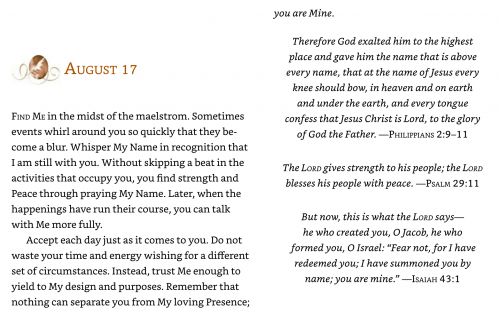Order, Disorder, Reorder:
Part Two
It
Must Happen to Us
Monday, August 17, 2020
Sooner or later, if we are on any classic “spiritual schedule,” some event, person, death, idea, or relationship will enter our lives that we simply cannot deal with using our present skill set, our acquired knowledge, or our strong willpower. It will probably have to do with one of what I call the Big Six: love, death, suffering, sexuality, infinity, and God. Spiritually speaking, we will be led to the edge of our own private resources. At that point we will stumble over a necessary stumbling stone, as Isaiah calls it (8:14). We will and must “lose” at something. This is the only way that Life–Fate–God–Grace–Mystery can get us to change, let go of our egocentric preoccupations, and go on the further and larger journey.
There is no practical or compelling reason to leave one’s present comfort zone in life. If it’s working for us, why would we? Nor can we force ourselves into the second stage of disorder (though we must certainly be open to it). Any conscious attempt to engineer or plan our own enlightenment is doomed to failure because it will be ego driven. We will try to “succeed” in the midst of our failure and “order” our time in disorder! But unexpected weaknesses, failure, and humiliation force us to go where we never would otherwise. We must stumble and be brought to our knees by reality. “God comes to you disguised as your life,” as my friend Paula D’Arcy wisely says. We must actually be out of the driver’s seat for a while, or we will never learn how to give up control to the Real Guide. It is the necessary pattern.
There must be, and if we are honest, there always will be at least one situation in our lives that we cannot fix, control, explain, change, or even understand. Normally a job, a fortune, or a reputation has to be lost, a house has to be flooded, an illness has to be endured. Some kind of falling, what I call “necessary suffering,” is programmed into the journey. By denying our pain or avoiding our necessary falling, many of us have kept ourselves from our own spiritual depths. We still want some kind of order and reason, instead of suffering life’s inherent disorder and tragedy.
Order, Disorder, Reorder:
Part Two
Disorder:
Stage Two of a Three-Part Journey
Sunday, August 16, 2020
Last week’s Daily Meditations focused on Order as the first stage of healthy development. To continue growing, we must go through a period—or even many periods—of Disorder. The pattern of transformation involves at least some measure of suffering. Part of us has to die if we are ever to grow larger (John 12:24). If we’re not willing to let go of our smaller selves, our norms, beliefs, and preferences, we won’t be able to enter the more expansive and inclusive space of Reorder.
The invitation from Jesus to move from one stage to another seems quite clear in his frequent invitation to metanoia: to turn around or change our minds. I remember having problems with that myself. I thought, “Why should I turn around? I’m baptized, confirmed, have shared the Eucharist, and am even ordained! I’m right!” How foolish and yet how typical of someone in love with Order. That’s precisely the stubbornness Jesus is talking about.
Almost inevitably, our ideally ordered universe—our “private salvation project” as Thomas Merton called it—will eventually disappoint us, at least if we are honest. At some point in our lives, we will be deeply disappointed by what we were originally taught, by where our choices have led us, or by the seemingly random tragedies that take place in all our lives. There will be a death, a disease, a disruption to our normal way of thinking or being in the world. It is necessary if any real growth is to occur.
Some of us find this stage so uncomfortable we try to flee back to our first created order—even if it is killing us. Others today seem to have given up and decided that “there is no universal order,” at least no order we will submit to. That’s the postmodern stance, which distrusts all grand narratives and ideologies, including often any notions of reason, a common human nature, social progress, universal human norms, absolute truth, or objective reality. Much of the chaos that reigns in the American culture and government these days is the direct result of such a “post-truth society.”
But permanent residence in Disorder is rather tragic and certainly unhelpful. It tends to make people negative and cynical, and usually angry. Searching for some solid ground, we can easily become quite opinionated and dogmatic about one form of political correctness or another. While some accuse religious people of being overly dogmatic, this stymied position worships disorder itself as though it were a dogma.
I can see why Christianity adopted the language of being “born again.” The great traditions seem to say the first birth is not enough. We not only have to be born, but remade. The remaking of the soul and the refreshing of the eye has to be done again and again.
